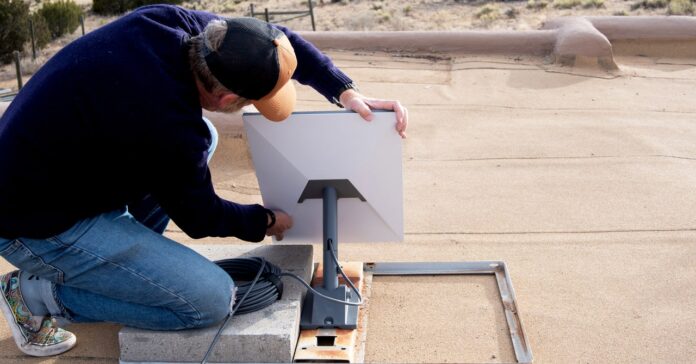SpaceX is seeking approval for changes to Starlink that the company says will enable gigabit-per-second broadband service. In an application submitted to the US Federal Communications Commission on October 11, SpaceX claims the requested “modification and its companion amendment will enable the Gen2 system to deliver gigabit-speed, truly low-latency broadband and ubiquitous mobile connectivity to all Americans and the billions of people globally who still lack access to adequate broadband.”
SpaceX said it is seeking “several small-but-meaningful updates to the orbital configuration and operational parameters for its Gen2 space station authorization to improve space sustainability, better respond to evolving demand, and more efficiently share spectrum with other spectrum users.”
SpaceX wants to lower the altitudes of satellites “at 525 km, 530 km, and 535 km to 480 km, 485 km, and 475 km altitude, respectively.” The reconfiguration will increase the “potential maximum number of orbital planes and satellites per plane” while keeping the planned total number of second-generation satellites at 29,988 or less. The FCC has so far approved 7,500 Gen2 satellites.
SpaceX CEO Elon Musk wrote Monday that “next generation Starlink satellites, which are so big that only Starship can launch them, will allow for a 10X increase in bandwidth and, with the reduced altitude, faster latency.”
SpaceX promised gigabit speeds in 2016, when the satellite system was just in the planning stages and didn’t even have a name yet. “Once fully optimized through the Final Deployment, the system will be able to provide high bandwidth (up to 1 Gbps per user), low-latency broadband services for consumers and businesses in the US and globally,” SpaceX told the FCC in November 2016.
As for actual speeds in 2024, Starlink’s website says “users typically experience download speeds between 25 and 220 Mbps, with a majority of users experiencing speeds over 100 Mbps. Upload speeds are typically between 5 and 20 Mbps. Latency ranges between 25 and 60 ms on land, and 100+ ms in certain remote locations.”
Changing Satellite Elevation Angles
Another request would change the elevation angles of satellites to improve network performance, SpaceX said. “SpaceX seeks to lower its minimum elevation angle from 25 degrees to 20 degrees for satellites operating between 400 and 500 kilometers altitude,” SpaceX told the FCC. “Reducing the minimum elevation angle in this way will enhance customer connectivity by allowing satellites to connect to more earth stations directly and to maintain connections with earth stations for a longer period of time while flying overhead.”
Meanwhile, upgrades to Starlink’s Gen2 satellites “will feature enhanced hardware that can use higher gain and more advanced beamforming and digital processing technologies and provide more targeted and robust coverage for American consumers,” SpaceX said.
SpaceX is also seeking more flexible use of spectrum licenses to support its planned mobile service and the current home internet service. The company asked for permission “to use Ka-, V-, and E-band frequencies for either mobile- or fixed-satellite use cases where the US or International Table of Frequency Allocations permits such dual use and where the antenna parameters would be indistinguishable.”
“These small modifications, which align with Commission precedent, do not involve any changes to the technical parameters of SpaceX’s authorization, but would permit significant additional flexibility to meet the diverse connectivity and capacity needs of consumer, enterprise, industrial, and government users,” the application said.
SpaceX said it also submitted “an amendment to the pending part of the Gen2 application requesting additional upgrades to its Gen2 system that the Commission has not yet addressed, including SpaceX’s orbital shells below 400 kilometers and frequencies beyond those requested in the original application.”
FCC Doubted Earlier Speed Claims
There’s no guarantee the FCC will approve the requests. Other satellite operators and mobile carriers have objected to previous Starlink plans, and the FCC has been skeptical of some of the company’s claims.
AT&T and Verizon recently asked the FCC to reject a key part of SpaceX’s plan to offer cellular service with T-Mobile. The mobile carriers say a SpaceX-requested waiver of FCC rules on out-of-band emission limits would interfere with and degrade service for terrestrial mobile broadband networks.
In March, the FCC denied a SpaceX application to use certain spectrum bands for mobile service. The decision forces SpaceX to seek changes in a rulemaking process in which the FCC would evaluate whether the spectrum bands can handle the system without affecting existing users.
The FCC questioned Starlink’s capabilities in 2022 when the agency denied an application for $886 million in federal funding that is supposed to be used to expand broadband access. The FCC decided that Starlink may not be able to consistently provide low-latency service with the grant program’s required download speeds of 100 Mbps and upload speeds of 20 Mbps.
At the time, the FCC called Starlink a “nascent” technology with “recognized capacity constraints” while pointing to falling speeds and a $600 upfront cost (which has since been lowered). SpaceX and CEO Elon Musk have continued to criticize the FCC for denying the grant.
The application for satellite-system changes is a very different matter than the grant. SpaceX’s proposed changes might solve some of the capacity and speed problems the FCC previously identified.
Other companies will have time to file objections. To obtain approval, SpaceX will have to demonstrate that the changes won’t negatively affect other spectrum users and satellite operators.
This story originally appeared on Ars Technica.
Source : Wired













